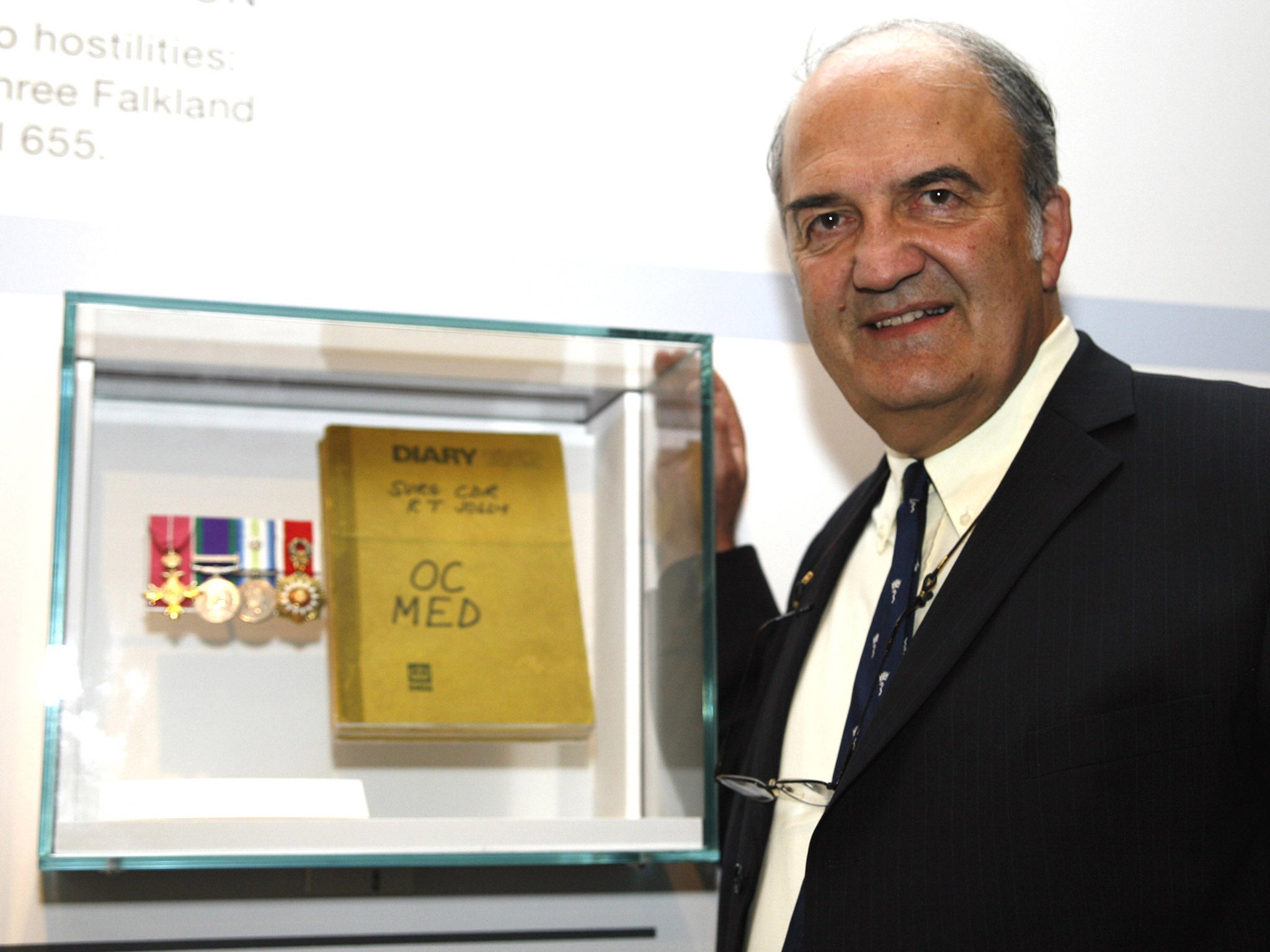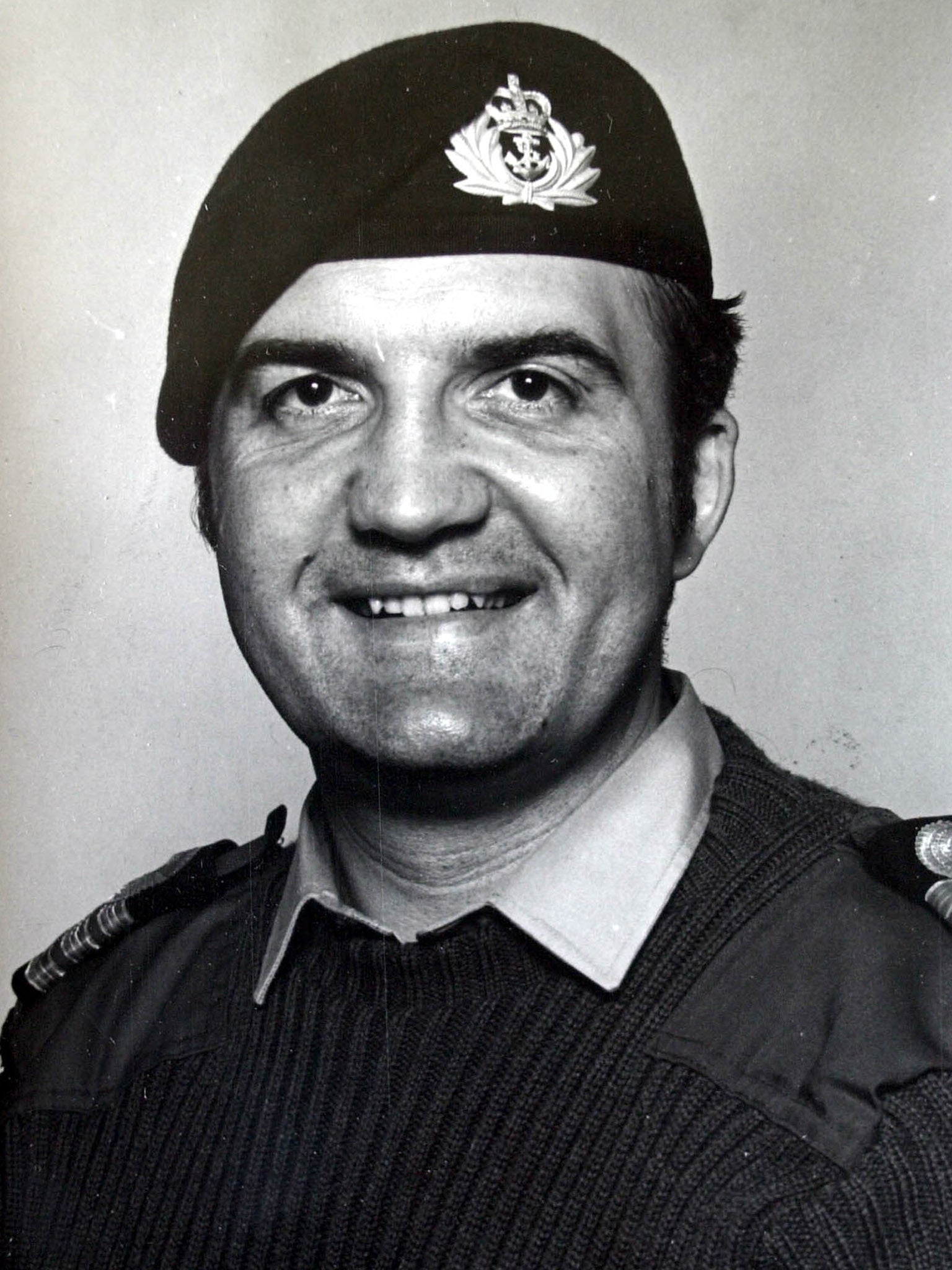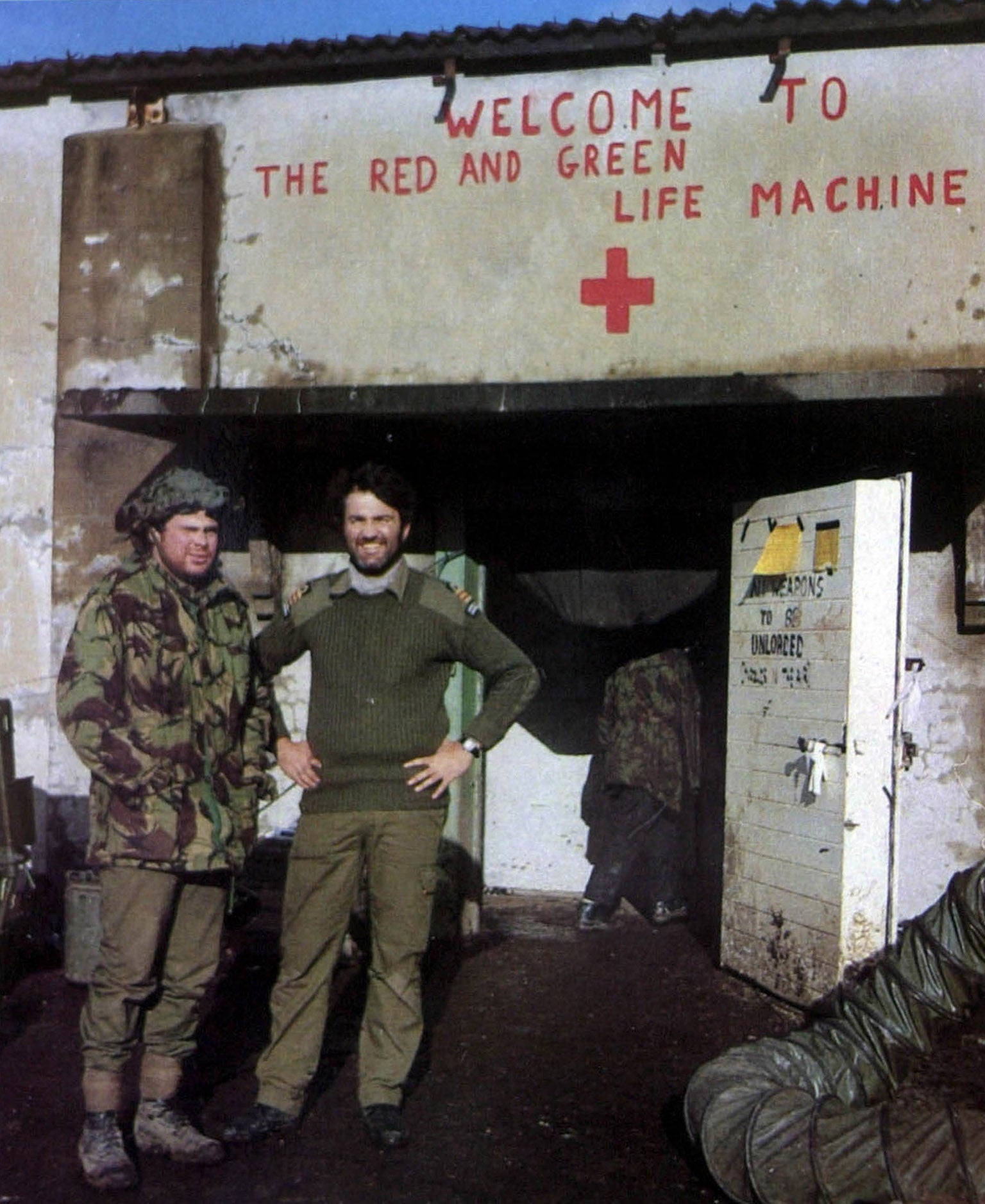Rick Jolly: Royal Navy surgeon who tended to British and Argentine troops during the Falklands War
When he visited Argentina in 1999 with Prince Andrew to receive an honour, he was greeted by 50 of the men he treated in his field hospital

Your support helps us to tell the story
From reproductive rights to climate change to Big Tech, The Independent is on the ground when the story is developing. Whether it's investigating the financials of Elon Musk's pro-Trump PAC or producing our latest documentary, 'The A Word', which shines a light on the American women fighting for reproductive rights, we know how important it is to parse out the facts from the messaging.
At such a critical moment in US history, we need reporters on the ground. Your donation allows us to keep sending journalists to speak to both sides of the story.
The Independent is trusted by Americans across the entire political spectrum. And unlike many other quality news outlets, we choose not to lock Americans out of our reporting and analysis with paywalls. We believe quality journalism should be available to everyone, paid for by those who can afford it.
Your support makes all the difference.Rick Jolly, who has died aged 71, proved to be the right man in the right place when he led the surgical team that patched up nearly 600 soldiers during the Falklands War in 1982.
He established the Armed Forces’ field hospital in the only suitable space: the islands’ largest building: an abandoned slaughterhouse and refrigerated mutton-storage complex at Ajax Bay. There, for six weeks, medics principally of the Royal Marines and the Parachute Regiment, were to toil doing surgery on a scale and of a kind few among them had witnessed before.
Jolly tended to battlefield horrors suffered by British soldiers.
He ensured this work continued even after Argentine pilots dropped two bombs on the hospital on its third evening of existence. The French-made devices lodged unexploded in the roof and had to be left there as casualties came in from the Battle of Goose Green on 28 May – day five of the war.
This was just about the moment, Jolly feared, when any time-delay switch on the bombs would have gone off. In the thick of urgent operating in makeshift theatres, the question of the bombs faded from his mind, but once 37 hours had passed since the air raid that delivered them – the known length of time possible for delayed explosion – Jolly handed round a tot of rum.
The hospital had no red cross on its roof because the mutton factory and outbuildings were also the storage place for combat supplies, all legitimate targets.
More bombs were to slice through it in the ensuing days, leaving holes in the structure that Jolly personally had to help secure against the islands’ driving rain and wind.
This ebullient man of fierce loyalties thrived in the exacting conditions of front-line surgery. The then Surgeon Commander Jolly would brook no nonsense from traditional rivalries between Paras and Marines, and marshalled all personnel together to make that clear.
Brigadier Julian Thompson, 3 Commando Brigade’s commanding officer, who led the land campaign in its first weeks, wrote of Jolly: “No Brigade can have been better served by its Senior Medical Officer and the teams he led” .

It was Jolly who closed the eyes of Colonel “H” Jones, VC, commanding officer of 2 Para, killed storming an Argentine trench at Goose Green. Winning that battle cost 20 British lives. Jolly performed post-mortems on the fallen at Ajax Bay, establishing the causes of death, and ascertained, contrary to rumour, that Jones had not been shot in the back.
The Ajax Bay hospital’s greatest test was the arrival of 170 casualties all at once after the bombing of the LSLs (landing ship logistics) Sir Galahad and Sir Tristram on 8 June at Fitzroy. Terribly burned Welsh Guardsmen who had been on board had to be treated by mixture of innovation and a protective cream called Flamazine, of which supplies were used up to the last tube.
Also crucial for the saving of lives was access to transport, a headache for Jolly both because of uncomprehending officers farther from the front line, and the loss of much equipment in the Argentine attack on and sinking of supply ship, Atlantic Conveyor on 25 May. All but one of the British Task Force’s Chinook helicopters had gone down with her.
Jolly recalled a message that was brought to him on 29 May from an unnamed senior officer. It said: “Request better assessment helicopter needs... give 24 hours’ notice of all further casevac [casualty evacuation] requirements.”
The wounded were treated first at Ajax Bay, then taken mostly by Sea King and Wessex helicopters to the hospital ship Uganda.
In the crisis “mass casualty situation” caused by the bombing of Sir Tristram and Sir Galahad, however, Jolly relied on the willingness of old acquaintances from his days in the Fleet Air Arm to bring up enough helicopters to ferry the injured across.
Jolly named the hospital “the Red and Green Life Machine”, after the Paras’ red caps and the Marines’ green ones, and painted the words in foot-high letters above the entrance.

Of the more than 580 men treated at Ajax Bay, nearly 200 were Argentine soldiers, on whom there were 78 operations. When blood for transfusions ran short Jolly persuaded some of the fitter Argentine prisoners to help replenish supplies.
Of all his skills called on in the Falklands, the least expected in the exclusively male surroundings of a war must have been Jolly’s training as an obstetrician. Yet before leaving the islands Jolly also performed an operation on a woman resident of the islands’ capital, Port Stanley.
He returned to the islands in 2002, decorated not only with an OBE but also the Orden de Majo of Argentina, an honour conferred to him in 1999 by its then President Carlos Menem. Visiting the country with the Prince Andrew, he was greeted by 50 of the men he treated.
After the Falklands war he stayed in the Royal Navy until 1996, reaching the rank of Honorary Surgeon Captain, with spells at Britannia Royal Naval College, and as a Defence Fellow at University College London. His ideas contributed to hospital arrangements during the first Gulf War in 1990, and soon after leaving he took a job as Ship’s Surgeon of the Royal Mail Ship St Helena.
As well as The Red and Green Life Machine (1983), which detailed the field hospital he set up, he compiled a dictionary of naval slang, Jackspeak (1991), with cartoonist Tugg Willson.
Both books are dedicated to his only child, James, who died in his late teens. Jolly gave up seafaring in 2002.
Born in Hong Kong, Jolly was educated at Stonyhurst College, Lancashire, and qualified as a doctor from St Bartholomew’s Hospital, London, in 1969. He married his wife, Susie (nee Matthews), who survives him, a year later. He joined the Royal Marines after working as a Royal Navy Reservist in Malta. He was a Flight Surgeon with the Fleet Air Arm, trained in winter conditions in Norway, and in 1974 during the Troubles served some months in Belfast.
Richard Tadeusz Jolly, Royal Navy surgeon, born 29 October 1946, died 13 January 2018
Join our commenting forum
Join thought-provoking conversations, follow other Independent readers and see their replies
Comments